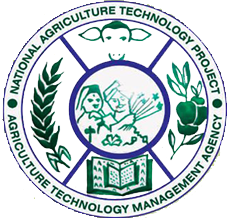AGRICULTURAL TECHNOLOGY MANAGEMENT AGENCY
ATMA is a registered society of key stakeholders involved in agricultural activities for sustainable development in the district by integrating research-extension activities and decentralizing day to day management of Public Agricultural Technology System.
ATMA SCHEME
PROPOSAL FOR ADOPTION OF REVISED ATMA SCHEME DURING 11th PLAN
Extension Reforms in India were pilot tested in 28 Districts of 7 States under Innovations in Technology Dissemination (ITD) component of World Bank funded National Agricultural Technology Project (NATP) during the period from November, 1998 to April, 2005. This successful experiment served as a basis to launch the Scheme "Support to State Extension Programmes for Extension Reforms" in its first phase since 2005-06. The National Development Council (NDC) in the year 2007 highlighted the need for revamping 86 strengthening the extension system to provide for improving the skill levels of the farming community and harnessing the potential of ICT in villages. The National Policy for Farmers, 2007 (NPF) envisaged support to State Governments for strengthening the extension machinery through re-training and retooling of existing extension personnel.
The institutional mechanism for extension under the Scheme has hitherto been as follows:
- SAMETI is the State level institution catering to the training and HRD needs of extension functionaries.
- Agriculture Technology Management Agency (ATMA) is responsible for coordination and management of agricultural extension related work in the District.
- Block Technology Team (BTT) consisting of line department representatives in the Block.
- Farmers Advisory Committees at Block level comprising a group of farmers to advise and provide inputs to the BTT.
On the basis of experience gained during the implementation of the Extension Reforms scheme from 2005 to 2009, the Government of India has revised the ongoing Centrally Sponsored Scheme "Support to State Extension Programmes for Extension Reforms" by modifying and strengthening the earlier Scheme.
The "Revised ATMA Scheme" has now been modified and strengthened with a strong manpower, infrastructure and activity as summarized below:
- Provision of specialist and functionary support at diffc ,vels viz. State Coordinator and faculty 86 supporting staff for SAMETI at State level, Project Director, Deputy Project Directors and supporting staff at District level and Block Technology Manager and Subject Matter Specialists at the Block level;
- Innovative support through a 'Farmer Friend' at Village Level @ 1 Farmer Friend per two villages;
- Revision in ATMA Cafeteria (i.e. list of extension related activities to choose from) to include some additional activities and to provide for enhanced unit costs for some of the activities;
- Farmers Advisory Committees at State, District and Block levels comprising a group of farmers to advise and provide inputs to the administrative bodies at each level;
- Support to SAMETIs for creating essential infrastructure; and
- Delegation of powers to State Level Sanctioning Committee (SLSCs), set up under Rashtriya Krishi Vikas Yojana, to approve the State Extension Work Plan (SEWP) prepared under the Extension Reforms Scheme.
Process Flow for Action Plans: SREP is a comprehensive document identifying research/ extension priorities for district, keeping in mind agro-ecological conditions and existing gaps in technology generation and dissemination in all agriculture and allied sector areas/ activities. SREPs will be prepared for new districts in coordination with the line Deptt. KVK, PRTs, Private Sector, Farmers and other stake holders at Distt. Level


